IOS Workshop on Fuller’s Future of Political Islam
September 29, 2018 at Institute Building, 162, Jogabai, Jamia Nagar, New Delhi
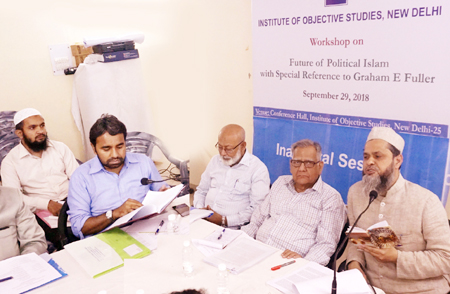
With a view to countering the Western discourse on Islam and the Muslim world, the Institute of Objective Studies engaged with scholars and ulema at its conference hall on September 29, 2018 at a workshop on Grarham E. Fuller’s Future of Political Islam. Fuller’s book written in 2003 generated a serious debate among experts on Islamic history with opinion sharply divided over the intent of the author. The book assumes importance because Fuller had served as the vice-chairman of the Central Intelligence Agency (CIA), and spent several years in five Muslim countries, including Muslim areas of China and Russia.
This book is the result of his study of these countries and formed the basis of his perception about the Muslim world. The day-long workshop was spread over five sessions, including inaugural and valedictory sessions.
Introducing the subject, Prof. Arshi Khan, department of political science, Aligarh Muslim University, noted that the present century could be identified with anti-Islamic policies and activities affecting the future of 57 Muslim-majority countries in the world. Most of the Muslim countries were rich in natural resources and strategic locations in addition to their heritage and contributions in most of the continents. He said that politically-motivated media launched campaigns to demonise Islam. As a result, the prevailing notion about religious, social, political and other aspects of Islam and Muslims had been purposive, directional, retributive and pejorative, creating psychological stress among Muslims all over the world.
Prof. Khan observed that as part of the introduction in the book, Fuller expressed his views on political Islam, Islamic terrorism and Islamic political spectrum. His description of Islam was quite pervasive and did not leave any aspect of Muslim lives concerned with any kind of organised behaviour in religious affairs. He traced roots of radicalism in Sayyid Qutb, Ibn Taimia and Abd-al-Salam Muhammad al-Faraj, and finally linked fundamentalism with Osama bin-Laden. He also dislodged Shariah, endorsed modernists and talked about the reconsideration of the intent of the Qur’an.
Fuller divided Islamists into categories – some were modernist, creative and wise, some were primitive, ignorant, even destructive. His agenda was concerned with the future and welfare of Muslims, but it was basically a disclaimer because, he added “As an American I naturally care strongly about the future and welfare of my own country”. Political Islam to Graham was concerned with the role of ulema and self-educated Islamic intellectuals.
Prof. Khan argued that the present Western order and its civilisational product could not be said to be superior in any manner. It also could not be considered the final model of history. Propelled by excessive consumerism, ruthless and senseless exploitation of natural resources and proliferation of deadly nuclear weapons and its continued dominance was fraught with dangerous consequences for future generations of mankind, world peace and the planet. It had already created more problems than it solved, more diseases than it treated.
Such a world order could not sustain itself for a longer period of time. He said that it was noticed in chapter two of Fuller’s book that he agreed with Islam as a religious ideology but not as a part of political ideology. Prof. Khan sought to know if Turkey would be the first country to succeed in reaching a genuine reconciliation and integration of Islamist and Western liberal democratic traditions.
Turkey had advanced farther in establishing modern institutions of democratic governance than any other Muslim state, an evolution shared by its Islamists. Thus Turkey’s task now was to open up fully its democratising system and to integrate those social and ideological elements that were left behind, or excluded during the forced Westernisation project. Referring to the UN assessment in mid-2002, he said that there were three major crisis areas for the Arab world that required urgent attention: lack of freedom of political order which prevented Arab states from utilising the human potential of their citizens and from initiating the needed reform; the woefully low level of education of its citizens, making them unfit to adapt to the conditions of the contemporary world; and the low social status of women which damaged the advancement of both the professional and social potential of Arab society.
Fuller talked about universality, commonality and plurality founded by religions, but it was possible when a particular religion was not treated with deep biases. Fuller also said that the force of Protestantism in Western history heralded the emergence of the autonomous individual on social and economic stage, able to think for himself or herself in a new economic environment that spurred individual initiative. According to him, the next two decades would place far greater demands and pressures upon Islamist movements as they would gain some position within the political order across the Muslim world.
Prof. Khan pointed out that Fuller said the fate of political Islam was internally linked to the cause of reform more broadly. He felt that Islamism was not the only vehicle for reform and change by any means, but it would be the dominant one, especially in closed societies. He insisted that political Islam would either adopt the radical reform agendas of the Left, or it would yield them to the Left and lose prominence. When that happened, we would probably see a resurgence of struggle between Islamism and the radical Left, somewhat reminiscent of the 1970s.
Prof. Khan referred to Fuller’s advocacy for a more benign, less confrontational international order and the diminution of terrorism in general. He concluded by saying that one could only hope that liberal Islamists would persevere to work towards renewed understanding of Islam in the modern age. He believed that if Islamists could not rise to this challenge, they would be soon supplanted by other political forces that did have something to offer. According to Fuller’s assessment, Islamists would come to power in several Muslim countries after 2023. He also believed that Jordan and Turkey would survive due to the presence of good Islam. Predicting that the United States would take pre-emptive action less often, he said that significant changes would take place in the Muslim world with liberal Islam surviving the crisis, Prof. Khan concluded.

Secretary General, IOS, Prof. ZM Khan, said the workshop was aimed at understanding the political theory of Islam. Though it was a beginning, it would pave the way for developing Muslim political thought. He said that the IOS was committed to taking the idea forward by setting the ball rolling. Nothing could be said for sure of the intention of Fuller, but he certainly offered an opportunity to study his book from different angles. Timing of the publication of the book was important as much as the notes on it by scholars who touched upon almost all aspects. The paradigm in which he wrote the book was equally important.
The book needed to be understood in the context of purpose, Prof. Khan said. This also explained the unilateral decision making and domination of US. Today, when the entire world was groaning under a burden of strife, Islam could provide guidance to salvage the world. But the Muslim countries were maintaining silence over the happenings in their neighbourhood. He said that Islam was based on the principles of unity, rationality and tolerance, and offered room for freedom of speech, criticism, dissent, etc. He pleaded that the book should be appreciated and properly analysed. He informed that all views on the book would be collected and brought out in book form.
Business Session-I
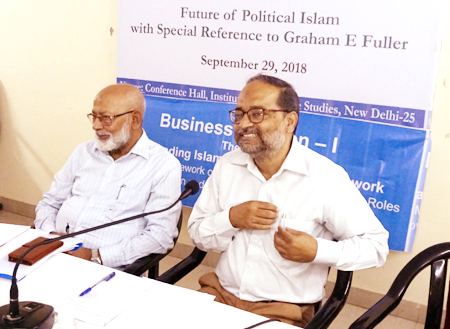
The inaugural session was followed by the first business session chaired by Prof. Mirza Asmer Beg of the political science department of AMU. The topic of the session was “Understanding Islam: A theoretical framework with discussion on the Ideational framework of political Islam and its multiple roles and the categorisation and relevance of Islamic movements”. Prof. Abdul Waheed, deptt. of sociology, AMU, who was the first speaker of the session, held that it was not an academic book. He quoted the views of the Marxist scholar, Cedric J. Robinson who described Islam as the most advanced religion. He also called Islam an ideal. According to Fuller, he said, Islamic civilisation was inert and static, and Muslims should be understood in that context. He noted that the book was intelligently written to serve some purpose.
Fuller’s remarks were not empathetic to Islam and he did not consider it as a political ideology. For him it was merely a religion. He appreciated the US as the most religious country, Prof. Abdul Waheed said.

Dr. Waris Mazhari, deptt. of Islamic Studies, Jamia Hamdard, held that the idea of political Islam could not be rejected outright. Western scholars viewed Islam also as a political thought because of dawah which contained freedom of speech as one of the aspects of political thought. He said that Western scholars treated Shia-Sunni divide as political. He called for studying political Islam in its different aspects.

Dr. Saeed Anwar, editor, Islam aur Asre-Jadid, noted that the book was more than academic and should be understood in that context. Fuller was a high-ranked officer of the CIA and spent about 16 years in Muslim countries studying their political and social life. Thus, it required thorough study and analysis, he said.

Dr. Md. Sohrab, deptt. of West Asian Studies, Jamia Millia Islamia, explained that the epistemology of Islam was inclusive of all the good things–universality of brotherhood, humanity, justice, etc. He believed that there might be a political project behind the writing of the book. But he rejected the thesis that political Islam was a project articulated by Western scholars. He brought home the point by stating that France, where Muslims were properly accommodated, did not have a trace of political Islam.

Dr. Fazlur Rahman from the Indian Council of World Affairs referred to a scholar who held that if one wanted to survive in the US, he would have to write on Islam and its politics. Under the prevailing circumstances, one would be recognised only when he upheld the Western value system. Islam had to play a bigger role against the backdrop of the challenges posed by Western political thought, he emphasised.
Md. Sajid, a researcher in the political science department of AMU, pointed out that the title of the book was objectionable. Islam stood for communal and religious harmony, and co-existence of all human beings. He said that the book was the result of a clash between two civilisations.
Business Session-II
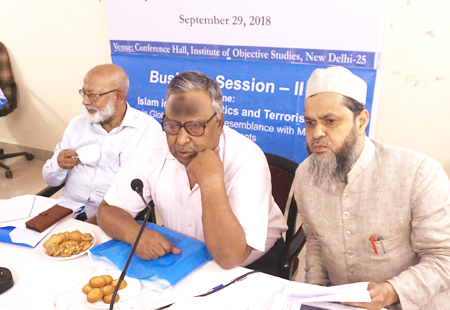
This session was devoted to “Islam in global politics and terrorism”. The other themes discussed at the session, included “Islam in global politics–Its resemblance with mainstream political movements” and “Islam and Terrorism.” The session was presided over by Prof. Abdul Waheed. Prof. Khwaja Abdul Muntaqim, former visiting professor, Amity University, who spoke on “Islam’s Big No to Terrorism”, traced the genesis of terrorism and held that the concern of the international community was not new and its beginning could not be attributed to terrorist attacks in New York, Washington and Pennsylvania on September 11, 2001.
After the assassination of king Alexander of Yugoslavia and the foreign minister of France by a foreign hand in Marseilles on French soil in 1934, the League of Nations sponsored a Convention for the Prevention and Punishment of Terrorism on November 16, 1937. He said that such acts of violence were not attributed to any religion, and rightly so. But, unfortunately, Islam was being presented as the religion of fanatics, barbarians and recently, of terrorists, though there were no cogent reasons to believe it.
Quoting Fuller he said, “While examining the social, economic and political context, Fuller explains that the struggle between the fundamentalists and liberals will determine the future of political Islam”. There was nothing like liberal Muslims, radical Muslims, non-radical Muslims, modern Muslims or orthodox Muslims. It was merely a figment of imagination. A Muslim was simply a Muslim, he observed. An act of violence should not be attributed to the religion of the person committing it. If such a subjective approach was adopted, all religions would be deemed to be religions professed by terrorists and perpetrators of violence, he concluded.

He was followed by Prof. Mirza Asmer Beg, who held that Muslims had a problem with Western political and social life. He said that the West had been dominating Muslim countries militarily, but after World War II the strategy was changed. Now the Western powers were dominating them by consent.

Prof. Ishtiyaque Danish, former professor of Islamic Studies, Jamia Hamdard and finance secretary, IOS, remarked that America created a situation in which one was forced to resist. This situation prevailed in Afghanistan and Palestine. Commenting on terrorism, he said that it was a global phenomenon. American social, political and economic system was pro-Europe and highly prejudicial to Third World countries, including the Arab world. Though the US faced no threat from Russia, Fuller devoted fairly good number of pages of his book to it. Fuller was one of several CIA officers who wrote books on international relations.
Prof. Danish castigated the US for targeting Muslims, but not uttering a single word against Israel which was demolishing Palestinian houses and grabbing their land. He accused America of blaming Afghanistan for exporting opium to Iran and other countries. Religious Muslims were dubbed as terrorists whereas 200 Americans were sent to Afghanistan to fight as the Taliban were not in a position to fight. He called terrorism a by-product of state policy.

Dr. Najmus Sahar from the deptt. of Islamic Studies, Jamia Hamdard, observed that the term terrorism was first used in France. She held that there was no place for terrorism in Islam and those who linked terrorism with Islam did not properly understand it.
The chairperson, while rounding up the discussion, noted that terrorism was multi-layered. He said that terrorism was a reaction against excesses committed by the state. Western media played up the issue of terrorism by describing it as the last attempt of Muslims, he added.
Business Session-III
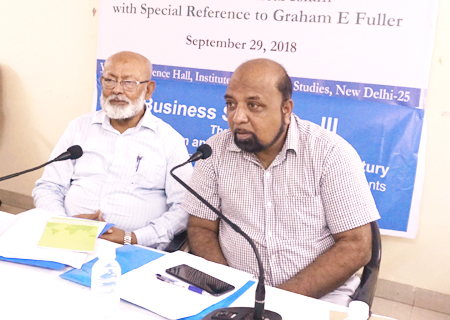
The third session, presided over by Prof. Ishtiyaque Danish, focused on “Islam, modernism and democracy in the 21st century.” The issues discussed in the session were, Islam and democratic order: Modern Islamic Arguments and Islam and West-A Futuristic Projection. The session began with the observations of Prof. Shamim Ansari, former professor of psychology, AMU. He contended that Islam is a religion based on the politics of values. He was critical of Fuller for adopting a negative approach to Islam. While touching upon terrorism, he never talked of terrorism in Georgia and other regions, but singled out Islamic terrorism to denigrate Islam and Muslims. He unreasonably attacked the Shariah and other personal matters of Muslims. He said that terrorism was a natural consequence of attack on Muslims, adding that Muslims were not terrorists. They were only defending themselves.
The West wanted Muslims to act as their pawns. That the Western world had launched a psychological war against Muslims was clear from the killing of Saddam Hussein and Osama bin Ladin. Owing to media manipulation, many Muslims failed to distinguish between real and the unreal. He also asked the Muslim community to develop a bent of mind that could tune in with the Qur’an and Hadith.

Dr. Saroj Giri of department of political science, Delhi University, commented that Islam was being currently debated in France, particularly in La-Hain, a suburb of Paris where majority of Muslims lived. Admitting that very little work had been done by think tanks on Muslim issues, he said that Islam was a universalist project as against the Western project to call itself universalist. The US had deviated from its role as a global policeman to wear the mantle of white ethno–nationalism, he remarked.

Dr. Khalid Khan from the Indian Institute of Dalit Studies noted that Kemal Ataturk introduced modern judicial system which was prevalent in Judaism. The ideas of Jalaluddin Afghani were just the reverse. According to Fuller, Turkey could be the best example of political Islam. He said that 20 percent of NGOs in Jordan were run by the Muslim Brotherhood.

Dr. Fakhrul Islam from Deoband held that the political aspect of Islam had to be understood clearly. Thus Fuller’s book should be understood and analysed in that context. He said that the influence of Western culture and thought started manifesting itself in Europe in the 17th century. Ulema in India also started to spread the puritanical Islamic thought through their writings. Notable among them was Maulana Mohammad Qasim Nanautawi, who laid seven conditions for a devout Muslim, he concluded.

Mr. Badre Alam, a research scholar in Delhi University and Mr. Abhay Kumar Mishra, a Ph. D. research scholar in Jawaharlal Nehru University also spoke on the occasion. Abhay Kumar held that certain ideologues were influencing policies in the US. Demonisation of Islam and Muslims was one of them. He drew parallels between the utterances of Western scholars and some Indian leaders. There was no distinction between Bernard Lewis, a British American historian who wrote against Muslims, and the Indian vice-president, except that Lewis is a scholar while the VP is not. He opined that the problems faced by Muslims and Hindus were similar. Muslims were as good or as bad as Hindus, he added.
Valedictory Session
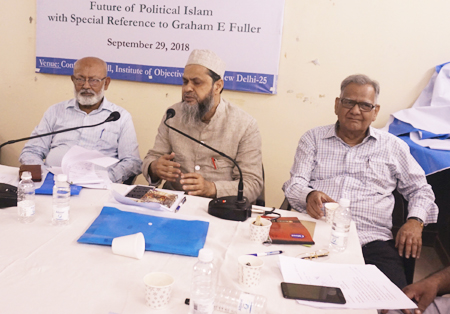
The valedictory session was presided over by Prof. Arshi Khan. Summing up the discussions, he said that Fuller wanted everyone to accept the Western idea of democracy. This simply meant acquiescence in the US policy of domination over the world.

In his valedictory remarks, the IOS chairman, Dr. Mohammad Manzoor Alam, called upon the scholars who participated in the workshop to accept the challenge posed by the questions raised in Fuller’s book and respond to them in an argumentative manner with supportive material on the subject. Describing the book as beautiful, he said that being an ex-CIA agent, Graham E Fuller had access to the classified information available with the US Administration. “We must study the book in all of its aspects and come out with answers supported by works of Islamic scholars, Maulana Abul Aala Mawdudi, Syed Qutub and others”, he said.
Explaining individual dignity as defined in the Qur’an, he said that removal of hunger, Iqra (read) and communication were three bases on which it rested. He warned against the imminent social conflict due to the accumulation of 80 percent wealth in the hands of 20 percent people. He suggested that a project to study the genesis of terrorism in the world should be taken up. He saw a ray of hope for Muslims in Recep Tayyip Erdogan, president of Turkey, Mahathir bin Mohamad, the prime minister of Malaysia and Anwar Ibrahim. Anwar Ibrahim wanted to join hands with Mahathir to ensure justice to everybody as equality and fraternity were the basic tenets of Islam.
At a time when attempts were being made to effect cultural change, the Qur’an was there to guide us. Allah has guaranteed against any change or alteration of His Word in the Qur’an. That was the reason why despite several attempts, the Qur’an remained intact till now, he emphatically said. He announced the constitution of a five-member committee headed by Prof. ZM Khan to go into the issues related to political Islam raised in Fuller’s book.

Other members of the committee are Prof. Mirza Asmer Beg, who has been made the convener, Prof. Arshi Khan, Dr. Aftab Alam and Prof. Abdul Waheed. Acknowledging that not much literature on Islam was available, Muslims must, however, use the books of Maulana Husain Ahmad Madni, Maulana Qasim Nanautawi and Maulana Abul Aala Mawdudi. He also suggested that a comparative study of religions should be made to prepare a book. He asked the scholars to keep in mind the intermingling of capitalism, socialism and communism, and the Western dominance over technology and ideology.
The workshop was followed by a question-answer session. The workshop was preceded by the recitation of a verse from the Qur’an by Hafiz Athar Husain Nadir. While Dr. Aftab Alam, asstt. professor of political science, Zakir Hussain College, Delhi University, conducted the proceedings, a vote of thanks was proposed by Prof. Ishtiyaque Danish. Prof. Afzal Wani, vice-chairman and Prof. Hasina Hashia, asstt. secretary general, IOS, were also present on the occasion.
|